Iranian President Severs Alliance with International Atomic Energy Agency
On 3rd July, Iranian President Masoud Pezeshkian directed the nation to cease its alliance with the International Atomic Energy Agency (IAEA). This decision followed the United States’ bombing of three Iran’s primary nuclear facilities amidst the aerial conflict between Iran and Israel. The transitional dialogue between Iran and the IAEA is expected to be ‘technical’ and ‘complex,’ as per a statement from Iran’s Foreign Ministry. This marks the first meeting with the IAEA since Iran severed its ties with the organization last month.
The diplomatic relationship between Iran and the IAEA deteriorated following a 12-day aerial battle led by the United States and Israel in June, which resulted in Iranian nuclear sites being directly targeted. On June 12, the IAEA had reported that Iran had violated its non-proliferation duties. This statement came a day before Israel launched previously unnanounced airstrikes on Iran, igniting the conflict.
No immediate comment was made by the IAEA about the visit from the deputy chief of the agency, which unusually will not include a planned review of Iranian nuclear sites. Esmail Baghaei, the spokesperson for the Iranian Foreign Ministry, disclosed to the media that there might be a discussion with Foreign Minister Abbas Aragchi. However, Baghaei stated it is too soon to anticipate the outcomes as these are demanding, intricate negotiations.
Furthermore, Baghaei expressed dissatisfaction with the IAEA’s ‘unique position’ during the June conflict with Israel. Baghaei criticized the international monitoring body for its lack of response to the bombing of a peaceful nation’s facilities that were under constant survaillance, while also failing to condemn the strikes as required by the agency’s mandate.
Aragchi had previously stated that future cooperation with the IAEA, which would now be subjected to the Supreme National Security Council’s approval, would focus on reevaluating the cooperation methods between both parties. This move is expected to further curtail the abilities of inspectors to accurately monitor Iran’s program that has been engaged in uranium enrichment nearing weapon-grade intensities.
As of 3rd July, Iranian President Masoud Pezeshkian commanded the nation to withdraw its collaboration with the IAEA. This directive came in the aftermath of the US bombing three significant Iranian nuclear facilities while Israel continued its aerial offense against Iran. The aerial assault led to nearly 1,100 fatalities, including numerous military officials.
In response to the airstrikes, Iranian retaliatory actions resulted in 28 deaths on Israeli soil. Historically, Iran has utilized selective IAEA inspections as a negotiation tool with the West. However, the timeline for resuming negotiations over its nuclear program with Washington remains uncertain.
According to US intelligence and the IAEA, their evaluations indicate Iran relinquished organized nuclear weapons programs around 2003. However, Tehran has been enriching uranium up to a concentration of 60%, which is technically a small step away from the weapons-grade threshold of 90%.
The recent escalations have heightened global concerns about the state of nuclear negotiations and the potential geopolitical implications. Despite Iran’s previous commitments to non-proliferation, the recent actions and statements present a critical challenge to existing dialogues and peace initiatives in the region.
A potential solution to this standoff still remains elusive. The move to suspend cooperation with the IAEA signifies a sharp turn in Iran’s foreign policy, proposing a new challenge in efforts towards achieving regional nuclear disarmament.
The coming months will be critical for international diplomacy as global powers seek to rein in Iran’s nuclear program. It will be interesting to see how the various actors involved will respond to these developments.
The large uncertainty hanging over Iran’s nuclear future has cast dark shadows over the safety and security of the region. It is unclear how this new geopolitical shift will impact both regional and global politics in the longer term.
While the overall outcome remains to be seen, this incident highlights the delicate balance at play when dealing with nuclear capabilities. Policymakers globally will need to navigate this issue with caution and tact, considering the potential devastating implications of nuclear conflict.

